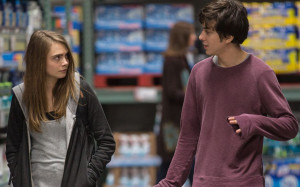“Paper Towns” Makes a Point…And Misses the Point
Warning: may contain spoilers for the book/movie.
After an epic (a word that has been used so often lately so as to have lost all meaning) night helping Margo (Cara Delevingne) take revenge on all of the people who have wronged her, Q (Nat Wolff) thinks their relationship will shift from friends to more than that. After all, he’s been in love with her his whole life. However, Margo has disappeared. Q, quite by accident, discovers a clue that she left behind. Believing that she left a trail so that he could find her, Q and his friends Radar (Justice Smith) and Ben (Austin Abrams) set about unraveling the mystery of Margo’s disappearance. The mystery culminates in the three boys – plus Lacey (Halston Sage), Margo’s best friend, and Angela (Jaz Sinclair), Radar’s girlfriend – road tripping from Florida to New York.
In Paper Towns (the latest John Green book to be adapted for the screen), Margo is, for most of the movie, an idea more than a person. We don’t really know much about her because the film is narrated by Q, who…doesn’t really know much about her, despite having lived across the street from her for most of his life. Her personality is whatever the other characters believe it to be. She is beautiful and mysterious and wacky and daring, and she often runs away and apparently has amazing adventures that become the stuff of legend. She is clearly A Big Deal at school (while walking down the hall, Q overhears snatches of conversation where people wonder where she went this time), yet when she disappears, the only people who seem at all concerned for her well-being are Q and Lacey.
One of the many criticisms I’ve seen, when people see the marketing for Paper Towns, is that is relies too heavily on the trope of the “manic pixie dream girl”. That’s supposed to be the point. Paper Towns is a story about friendship, adventure, and love, but it’s also about the importance of seeing people as people and not objects or ideas. However, the  film kind of subverts its own message; in hitting you over the head with the knowledge that Margo is not a “manic pixie dream girl”, that’s exactly what they make her, because the entire point of her character is to spur Q’s growth as a person. The book conclusion gives Margo slightly more autonomy than the film does; the film also softens her rougher edges and makes her seem less abrasive.
film kind of subverts its own message; in hitting you over the head with the knowledge that Margo is not a “manic pixie dream girl”, that’s exactly what they make her, because the entire point of her character is to spur Q’s growth as a person. The book conclusion gives Margo slightly more autonomy than the film does; the film also softens her rougher edges and makes her seem less abrasive.
I still believe that Paper Towns does a good thing by having Margo state exactly what Q’s problem is – he isn’t in love with her, he doesn’t even know her – and Q’s ending narration reminding everyone that in the end, Margo was just a girl. But I was disappointed in their final confrontation, especially when Margo offered to let Q join her. I think that in making its point, it completely misses the point.
There are things to like about Paper Towns. I was a big fan of the friendship among the three boys – Wolff, Abrams, and Smith have fantastic chemistry, and I truly believed I was watching a group who have been friends since they were fetuses. While the end of the adventure did change Margo’s character, it also added a conflict between the three boys that was lacking in the book, which I actually really liked. This scene, more than anything I think, really helped hammer home the idea that Q’s obsession with Margo was not a good thing (something that is often glossed over in films with similar themes).
The addition of Angela to the road trip was an inspired choice, because she was an awesome character who needed to be around more in the book, and because I will never argue with more girls showing up on my screen. There is some clever humor; although I could have done without the pee scene, their pit stop at a random gas station was great (there is a cameo here that I had not expected that literally made me snort with laughter). I also really enjoyed the soundtrack.
In the end, I did enjoy Paper Towns, but as a film that I had hoped would helped deconstruct or even end the “myth” of the manic pixie dream girl (or at least the idea that such a girl exists only for the purpose of the male character), I feel it fell short of its goal.
Author: Jamie Sugah
Jamie has a BA in English with a focus in creative writing from The Ohio State University. She self-published her first novel, The Perils of Long Hair on a Windy Day, which is available through Amazon. She is currently an archivist and lives in New York City with her demon ninja vampire cat. She covers television, books, movies, anime, and conventions in the NYC area.
Help support independent journalism. Subscribe to our Patreon.
Copyright © The Geekiary
Do not copy our content in whole to other websites. If you are reading this anywhere besides TheGeekiary.com, it has been stolen.Read our




